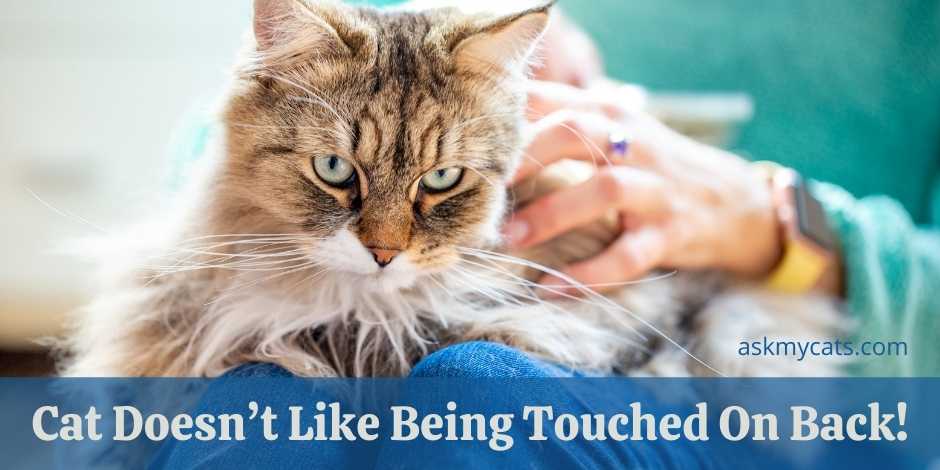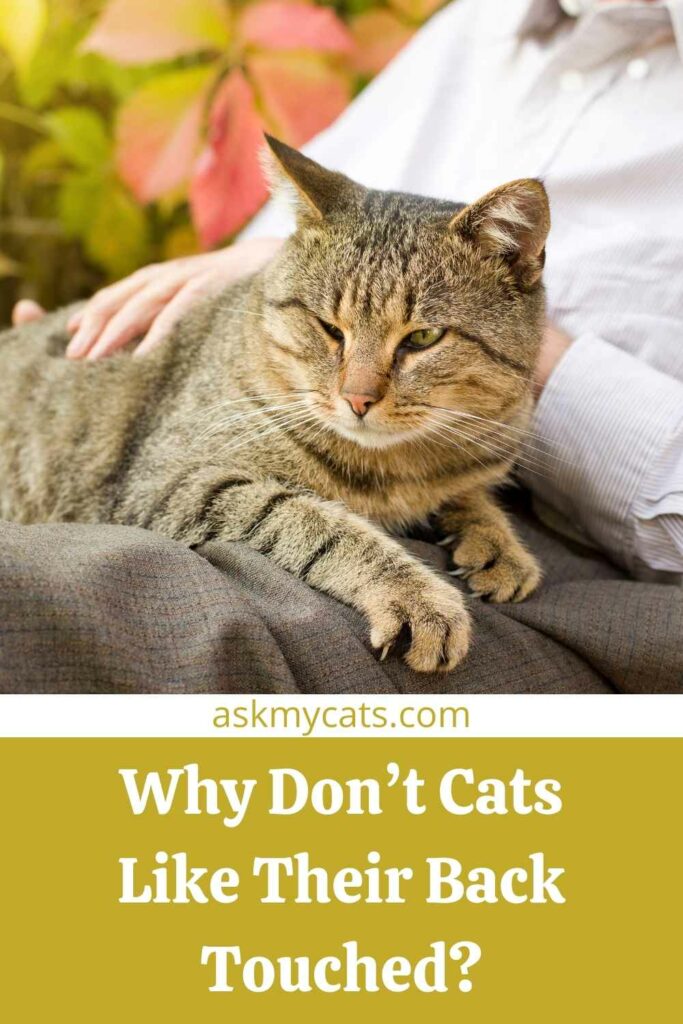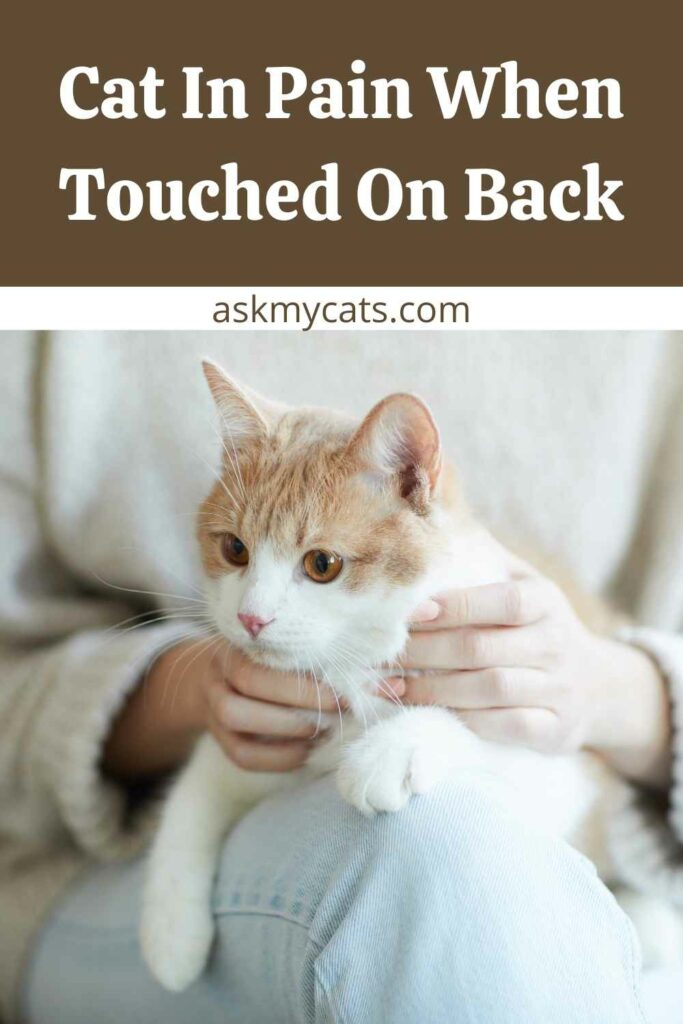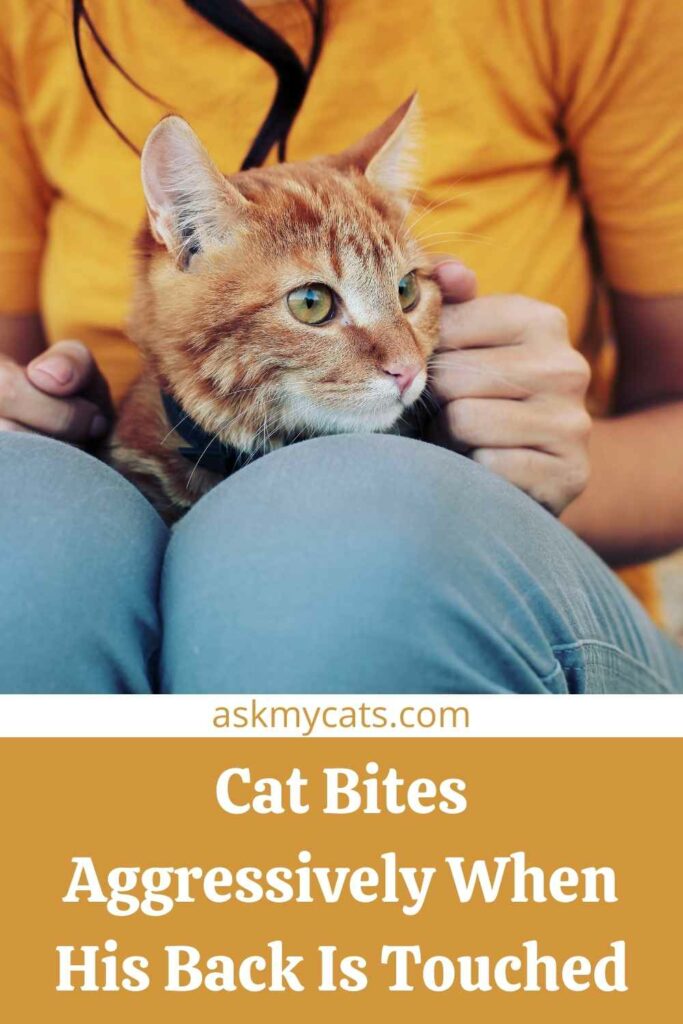Except when they’re unwell or injured, most cats like being rubbed on the back. If your cat refuses to be stroked on the back, it’s probably in pain.
If your cat’s rear skin ripples when you touch it, it’s likely suffering from anxiety or hyperesthesia (an obsessive-compulsive disorder). Arthritis, damage, or inflammation of the spinal discs may cause your cat’s back to feel stiff to the touch.
Reduce tension and change the way you touch your cat to reduce back discomfort caused by anxiety or hyperesthesia. However, in order to minimize spinal injury, more serious problems must be treated by a veterinarian.


Give Your Cat the Perfect Day
Get the Free Ebook!
Why Don’t Cats Like Their Back Touched?
If your cat doesn’t like their back to be touched it means that they are experiencing physical difficulty.

Most sociable cats, on the whole, prefer being caressed around the base of their ears, under their chin, and around their cheeks, which is where their facial glands are located. These regions are often favored above the belly, back, and base of their tail.
When your cat elevates its back, it’s a sign that they believe in you and value what you’re doing. They might also be attempting to make petting more pleasurable by applying additional power.
Kidney issues, like your cat’s back, are another common source of pain. If your cat’s kidneys are starting to fail (which is a very regular occurrence), they may begin to avoid touching their back.
Depending on how serious your cat’s illness is, both scenarios may usually be controlled and treated. Your best strategy is to take your cat to the vet on a regular basis and to make extra visits as soon as problems arise.
If your cat likes to elevate its butt while you’re caressing them, it’s possible that they’re requesting that you pet the back of its tail and hips. Some cats enjoy being caressed in particular regions, while others would prefer that their people not be petted there.
However, if your cat is female and not fixed, she may be acting in a completely different way. When female cats are in estrus, often known as heat, they are more prone to elevator butt.
Also, find out why does my cat not want to be touched
Because your cat is practically appearing as if she were a male cat, this is the case. When your cats are acting like this, the best thing you can do is wait for the heat to pass before taking them to the clinic to be fixed.
Another typical reason cats elevate their backs and rear ends are because it reminds them of kitten-like habits. When you and your cat have developed a bond of trust and care, they will regard you as a surrogate mother.
You feed them, pet and groom them, and offer them attention, amusement, and support, much like their mother. Mother cats also assist in grooming their kittens’ rear halves, as it takes a long time for cats to reach such areas on their own.
Some of their activity stems from their memories of their mother combing them when they were kittens.
The last reason cats do this is because their rear hips and low back are difficult for them to reach and brush. They may be itchy there, or they may like the soothing massage of rubbing and caressing.
As you know, normal cats are incredibly flexible. If a cat is presenting their back to be rubbed because it can’t reach it for itself, there has to be something seriously wrong.
This type of caressing isn’t enjoyed by all cats, as we’ll see in just a bit.
Bum pets are the finest potential pets for certain cats. If you’re paying attention, they’ll quickly elevator butt. We’ve even seen cats become enraged when humans refuse to scratch their hips.
You might also like to read about why do cats like butt pats
Cat In Pain When Touched On Back
Your cat is facing pain in the back region and so they are not allowing you to touch that place.

As there are numerous nerve endings near the base of their tails and around their hips, your cat is more likely to appreciate the experience.
Another possibility is that your cat is utilizing that position to aid in the transmission of its smell. Anal smell glands, as well as certain scent glands near the base of the tail, are found in cats.
Some cats appear to resent rubbing their scent glands on people, while others appear to believe it is an important aspect of establishing their territory and favorite individuals.
Don’t be concerned. You won’t be able to sense those glands’ fragrances. The fragrance is a way for cats to communicate with one another. You won’t need to shower after this type of petting, even if your cat believes it’s necessary to make you smell like them.
On the other hand, there are a lot of cats who don’t appreciate having their backs or rear ends petted.
The good news is that cats refusing to allow their lovers to scratch their backs isn’t always an indication of dislike or distrust. That might be a factor early on in your relationship, but a well-socialized cat with a solid bond with you may just dislike that type of stroking.
There might be several explanations for this. The most likely reason is that they have many sensitive nerve endings down their backs, especially towards their tails. Petting such places can make the most sensitive cats feel like they’re being tickled, which they don’t appreciate.
However, there are a few situations in which you should be more worried about your cat’s dislike of having its back stroked.
It’s probably time to take your cat to the doctor if this behavior is abrupt or if your cat appears to be in serious pain when its back is handled. Cats, like people, can have spinal disc issues, and acute back pain could indicate that anything is amiss.
You might also like to read about why do cats like the base of their tail scratched
Cat Bites Aggressively When His Back Is Touched
Most cats provide some sort of indication that they aren’t enjoying the attention any longer. They used to like the petting, but now they find it bothersome or painful so they will bite aggressively when his back is touched.

Aggression is a frequent behavioral problem in cats, and it is an indication of a deeper issue. It must always be regarded seriously. Cats of any breed, size, age, or gender can exhibit aggressive behavior. Aggression in cats when stroked or petted can be motivated by a variety of factors.
Dilated pupils, retracted ears, and a twitching tail is all signs of a terrified cat. In this circumstance, your cat may growl, hiss, or swat at the person who is reaching out to touch, stroke, or pet your cat.
Aggression might be a natural reaction to being touched or handled in places or ways that your cat finds unsettling. It may also occur if the petting or handling has gone on for an extended period of time. Overstimulation in certain cats leads to petting-induced aggressiveness.
The level, to which cats like caressing or handling, as well as how long they will accept it, varies greatly. They also differ substantially in the amount and intensity of warning signals they will provide before attacking their handler.
Even moderate kinds of hostility can escalate into significant violence if not treated correctly.
Keep petting sessions to a minimum. If you know your cat dislikes being caressed in a certain style or in a certain place, don’t do it. If your cat is having fun or is becoming angry, they will let you know.
Even if you are comfortable with the amount of hostility, your cat is expressing their stress. Ignoring their warnings promotes biting behavior and increases the likelihood of future aggressive occurrences and/or intensity.
Pet your cat just in places where they are happy. Most cats like rubbing their noses or bodies on an extended hand, but not lengthy strokes across their bodies. It’s crucial to get to know your cat.
Also, check out why do cats lift their bum when you pet them
Why Do Cats Hate Being Scratched On Their Lower Back?
Cats hate being scratched on their lower back when they are suffering from Feline Osteochondrodysplasia of the Scottish Fold.
Although this ailment is uncommon, it is worth highlighting since it can result in serious and irreparable spinal cord injury if not treated promptly.
Feline osteodystrophy is a condition in which the bones develop abnormally. It can produce excruciating pain, deformity, stiffness, and a fear of jumping or walking.
A diet lacking in calcium, iron, and vitamin D, especially in kittens, is a risk factor. Siamese cats are fussy eaters, which may explain why there are so many cases of osteodystrophy in them. These deficits can also affect cats that are only fed leftovers.
Dietary adjustments (increased calcium, iron, and vitamin D consumption) and seclusion for many weeks are part of the treatment.
You might like to read about why won't my cat let me pet her
Frequently Asked Questions
Why does my cat go crazy when I scratch her back?
Due to the extremely sensitive nerve endings grouped near the base of the tail, cats respond strangely when scratched. At first, a few soft strokes may seem comforting, but prolonged tail caressing can be overstimulating or uncomfortable.
Do cats like their tails to stroke?
The majority of cats dislike having their tails touched. For what it’s worth, the length of a cat’s tail is an excellent indicator of how excited she feels as a consequence of your caressing. You should keep your hands to yourselves the sooner it starts moving.
Why do cats lift their bums when you pet them?
Felines may also pass their fragrance through their anal glands, so when they lift their tush, they’re actually requesting you to check whether they’re a family member and share odors. As revolting as it may seem, it appears to be one of the finest accolades a cat can confer on its devoted owner.
Final Words
If you feel your cat is suffering from hyperesthesia or anxiety, you may be able to help them. Allow your cat to take the lead by caressing it more gently. Additionally, to help your cat feel safer, reduce any causes of tension in the house and utilize a pheromone plug-in.
Leave your questions in the comments section below.
